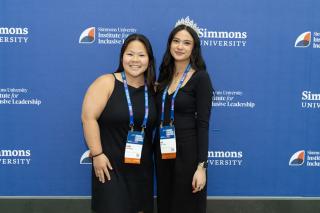Simmons University Students: Master the Art of the Ask for Leadership and Networking Success

At Simmons University, effective communication is more than a skill—it’s a cornerstone of leadership and networking. The campus’s Applied Inclusive Leadership course (BUS 375) and the annual Simmons Leadership Conference (SLC) demonstrate how classroom theory can translate into real‑world impact through guided practice in the “Art of the Ask.” This article outlines how the program equips students with essential asking techniques, how role‑playing enhances confidence, and why these skills matter for academic and professional growth in the United States.
Why Asking Matters in Leadership and Networking
In the American business landscape, leaders must secure resources, forge partnerships, and gain stakeholder support. These tasks hinge on the ability to present a compelling request—whether it’s funding, mentorship, or collaboration. The Simmons curriculum emphasizes that the “ask” is as critical as the solution you propose. By mastering question framing, tone, and visual cues, students learn to navigate the nuanced expectations of diverse audiences.
BUS 375: Applied Inclusive Leadership and the “Art of the Ask”
Designed for business majors, the summer module invites participants to craft short pitches that request real or simulated resources. Students like Isa Trello, a business‑management major with minors in health‑care management and finance, report that the class helped them transform from hesitant participants to confident presenters. The course leverages improvisational exercises led by Kristen Palson, COO of the Simmons Institute for Inclusive Leadership and Executive Producer of the SLC.
Key components of the program include:
- Scenario Development – Students select a leadership scenario tied to the upcoming SLC.
- Pitch Practice – Each student delivers a concise, data‑backed request followed by peer and faculty feedback.
- Feedback Loops – Real‑time critiques on clarity, persuasiveness, and executive presence refine each iteration.
- Role‑Playing Dynamics – Palson and guest speakers play varying stakeholder personas, from supportive to skeptical, challenging students to adapt on the fly.
Benefits Beyond the Classroom
Students leave the activity with several tangible gains:
- Enhanced public‑speaking confidence that carries into interviews and board‑room presentations.
- Improved reading of body language, crucial for stakeholder negotiations.
- Broader networks, as the class encourages exchanging contact details and leveraging LinkedIn for outreach.
Case Study: Isa Trello’s Transformation
Trello’s experience exemplifies how role‑playing can shift networking habits. Before the module, she had fewer than 50 LinkedIn connections. After actively practicing pitches and engaging with simulated stakeholders, she expanded her network to over 130 connections and secured a speaking role at the SLC stage alongside Palson’s improv troupe, Second City Works.
Her take‑away:
“If you want to work on networking, client‑centric communication, and break out of your shell in the business world, you should definitely take this class. I entered this class with minimal industry contacts and left with strong professional ties.”
Integrating the Ask into Professional Development
For students and emerging professionals outside of Simmons, the principles demonstrated in BUS 375 are universally applicable. Consider these strategies:
- Preparation of a Elevator Pitch – Practice summarizing your request in 60‑seconds.
- Feedback Seeking – Ask peers or mentors to critique your delivery.
- Simulation of Stakeholder Resistance – Anticipate objections and map rebuttals.
- Follow‑Up Communication – Draft concise thank‑you notes and next‑step proposals.
Linking the Ask to Inclusive Leadership
A core tenet of the Simmons Institute for Inclusive Leadership is to empower underrepresented voices. Effective asks bridge gaps between diverse stakeholders and resource pools. By framing requests with sensitivity to differing viewpoints and showcasing data that demonstrates shared benefits, leaders ensure equitable access to opportunities.
Inclusion in Request Framing
When drafting an ask, balance the following:
- Use concise, jargon‑free language to promote clarity.
- Incorporate measurable outcomes relevant to the stakeholder’s interests.
- Acknowledge potential barriers or concerns to show empathy.
Action Steps for Aspiring Leaders
Interested students and professionals can adopt the following roadmap:
- Identify a real‑world scenario needing a request—budget, partnership, or support.
- Craft a brief, evidence‑based pitch outlining the benefit to the stakeholder.
- Practice with a friend, mentor, or online recording tool to refine delivery.
- Seek constructive feedback and iterate until the ask is compelling.
- Follow up with stakeholders—personalized emails or LinkedIn messages that echo the key points.
Why This Matters in the U.S. Market
American businesses increasingly value cross‑disciplinary knowledge and inclusive approaches. Graduates who can articulate clear requests and navigate stakeholder dynamics secure roles in corporate strategy, nonprofit leadership, and consulting. Simmons’ emphasis on the “Art of the Ask” aligns with the evolving expectations of U.S. employers who demand leaders who can negotiate, collaborate, and drive impact efficiently.
Next Steps for Prospective Students
Whether you plan to join Simmons or seek similar program offerings, consider how the “art of the ask” will strengthen your career trajectory:
- Explore the Applied Inclusive Leadership curriculum at Simmons University’s program page.
- Review the upcoming schedule for the Simmons Leadership Conference to experience real‑world scenario building.
- Reach out to career services to discuss how role‑playing can complement your professional development plan.
Call to Action
Ready to elevate your leadership presence and network? Submit your application today to join Simmons University and engage in courses that turn theory into practice.
Stay engaged: Read our latest campus news and discover more on how students are transforming the way they lead.
Have questions? Write to us! Join the conversation and share how you would use your next ask to make an impact.

